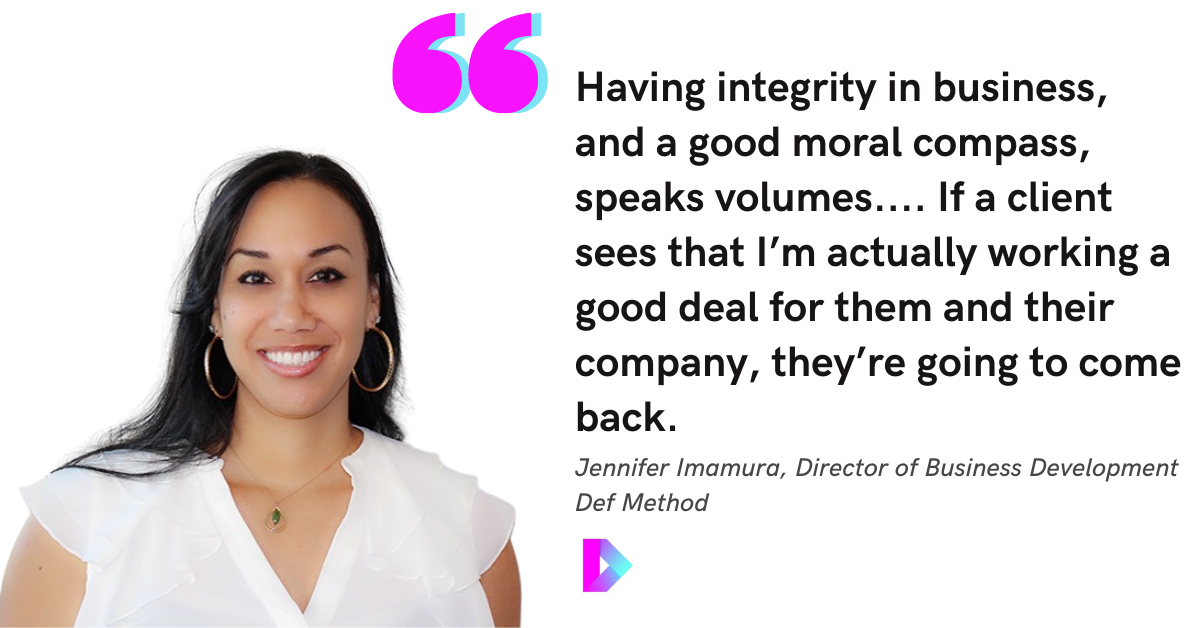When Jennifer Imamura joined software consultancy Def Method as Director of Business Development last year, the first thing on her agenda wasn't building a sales pipeline.
It was meeting people.
Meeting everyone, in fact.
"I met with every single person at Def Method," says Jennifer, who adds that the agenda for those conversations with her new coworkers included their passions, what kinds of projects they wanted to work on, and what their goals were. "Getting to know people like that lets them—and me—show some vulnerability. And it builds trust. It allows people to understand that I'm in this for you."
Being able to connect well with people is one of Jennifer's superpowers, and knowing how to connect those people to projects and strategic initiatives is another. Together, they allow her to develop cross-functional solutions—that is, to solve client problems with a combination of engineering, product management, and design resources.
We sat down with Jennifer to hear more about her career path into sales (including why she initially swore sales wasn't for her), as well as the advice she has for engineering and sales teams looking to collaborate in order to serve clients, build pipelines, and find solutions.
"Do the right thing"
Jennifer grew up in doctors' offices.
Not because she was sick, but because her mom worked as a manager of several private practice physician's offices in Beverly Hills. Jennifer's first job was filing charts, and she worked as a receptionist and in the back office of doctors' offices throughout high school, undergrad, and her MBA program.
Then her boss, the head physician at the private practice she was managing, told her she needed to leave.
"He gave me the best advice. He said, 'You have to keep moving. You've worked your butt off to get this MBA, go get a corporate job and move up in this world,'" she recalls.
Jennifer took his advice and took a role in the back office of a multinational corporation, even though it required taking a pay cut at first. She made up for it with regular promotions and transfers, moving to operations and then strategy and eventually sales.
"Ironically, I never wanted to go into sales or business development," says Jennifer. "I didn't want to have to get in front of people. But my boss at that organization said that I had the charisma, the energy, what it takes...and even though he was right, it was important for me to take those steps of learning how a business operates, because that's what set me up for greater success as a sales leader."
And now, after years of sales success—at that corporation, then at a Chicago-based software development shop, and now at Def Method—Jennifer still manages her career with the values she learned in those doctors' offices.
"Physicians are supposed to do the right thing for their patients. I learned very early on that you've got to do the right thing for your client, and that stuck with me," she says.
Redefining What Success Looks Like by Developing a New Approach
Doing the right thing for her client is sometimes at odds with closing the biggest deal possible. Jennifer still sticks with the former.
"Having integrity in business, and a good moral compass, speaks volumes. Salespeople looking for the big win and the big payout are usually miserable," she says. "If a client sees that I'm actually working a good deal for them and their company, they're going to come back."
Her commitment to actually solving client problems in a way that looks out for their bottom line is what helped Jennifer see the value in cross-functional solutions.
Here's how she explains them: "They're complex offerings that include different departments or teams from my side, making sure we work together to create the optimal service for our client. While including the different teams on their side, too."
In action, that might look like working with a client who wants a custom app built. They know they need engineering, because they have a great product vision. But if they don't have a plan and roadmap for how to actually build it, they may need product management resources, too. And if they want it to look good? Well, Jennifer would bring in her design team to make it visually appealing.
"Cross-functional selling is much more efficient and effective than just selling the shiny box or saying, 'Hmm, Mr. Client, you need all of this and you need all of that because it's the deluxe package,'" says Jennifer. "It's more thorough, it's more thoughtful, and from my perspective, it's the right thing to do."
Three Common Challenges—And Three Ways to Address Them
Selling cross-functionally requires getting a lot of people in the same boat rowing in the same direction, and that's not always easy. Jennifer shared some of the common pitfalls to this kind of collaboration, as well as advice for overcoming them:
- Finding alignment with other teams or departments. It can be hard to get on the same page with people whose goals or metrics for success are different than yours. What has worked for Jennifer is creating opportunities for teams to interact more regularly and share their goals, including a biweekly internal meeting with her engineers to check on their job satisfaction and morale.
- Trusting your team. "I have to trust my team to be able to help me build the solution. If I don't trust them, if I don't believe that they are experts also, it can't happen," says Jennifer. Her initial meeting circuit helped build that foundation, and regular check-ins help push it farther. "Every day I have to see these people. I want them to go and start their day with, 'Yes, this is a good project, I'm happy to do this,' not 'Ugh, I'm ready to rip it off,'" she says.
- Knowing the product and service. You can't sell what you don't understand, and custom software solutions can be especially difficult to understand. "It's not a box, or a bundle, or 'choose option A, B, or C,'" says Jennifer. "You start from scratch in every single conversation. You have to really listen, pay attention, and do the research." Jennifer got caught up by reading books on project management, taking classes on coding and project methodologies, and using Def Method's generous learning and development budget and time allowance to attend webinars and conferences to keep pushing her understanding.
Working through those challenges is more than worth it, says Jennifer. "Being able to work with people from different teams, people who think differently, it helps me sell better. It helps me see from their perspective the value in what we're doing."




